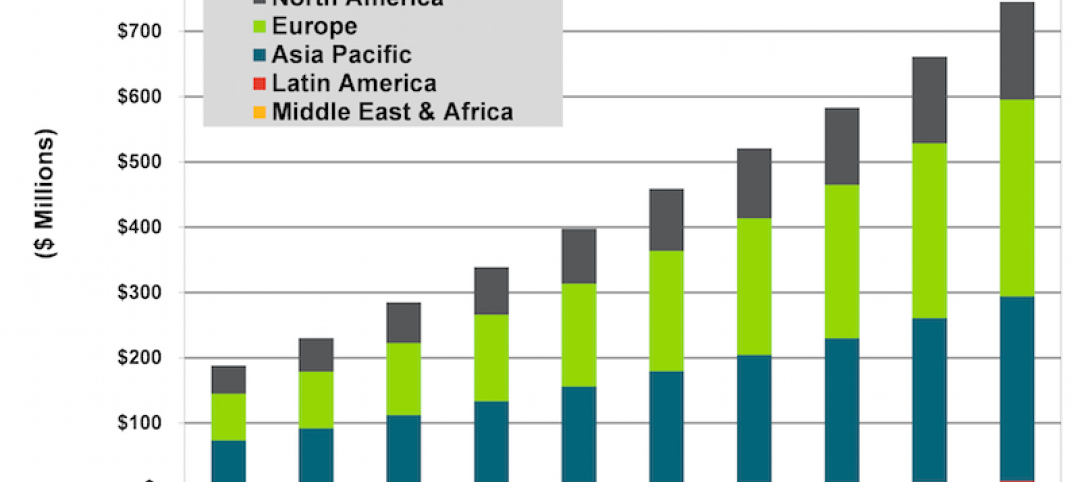1. Buildings as "open source platforms" (BD+C)
"NBBJ’s year-old Design Performance Group helps building teams make smarter choices earlier."
2. 3D printing finds its groove fabricating face shields during COVID-19 crisis (BD+C)
"3D printers have become invaluable tools for producing much-needed personal protective equipment during the COVID-19 pandemic. Tech companies such as Apple and Blue Origin, manufacturers like Ford Motor Co., and universities such as Duke and Harvard, have been using their printers to churn out face shields for first-line medical workers."
3. Missouri’s first Alternate Care Facility ready for coronavirus patients (BD+C)
"The project yielded more than 100 patient rooms on the four floors of the 130-room hotel. The team built a nurses’ station on each floor and turned the existing phone system into a nurse call system. Beds and furniture were moved. Extra furniture was put into temporary storage. PTAC units in rooms were inspected and repaired or replaced as necessary. Hardware was changed on hotel room doors and bathroom doors to disable locks. All rooms were deep cleaned. In 13 rooms, carpet was removed and walls and ceilings were painted."
4. AIA publishes 'Guide to Business Continuity' to help architecture firms remain resilient (AIA)
"The guide provides firm leaders with insights into managing staff, premises, technology, information, supply chains, stakeholders, and reputation, so a firm can continue to provide services, generate revenue, and reduce the consequences of business interruption."
5. Medical Office Buildings Poised for Quick Recovery (Commercial Property Executive)
"The tenants of many medical office buildings have closed their offices temporarily, but the long-term prospects for this property type are robust."
For more top stories from BD+C,
sign up for the BD+C Daily 5 newsletter
Related Stories
Market Data | Jun 14, 2016
Transwestern: Market fundamentals and global stimulus driving economic growth
A new report from commercial real estate firm Transwestern indicates steady progress for the U.S. economy. Consistent job gains, wage growth, and consumer spending have offset declining corporate profits, and global stimulus plans appear to be effective.
Market Data | Jun 7, 2016
Global construction disputes took longer to resolve in 2015
The good news: the length and value of disputes in the U.S. fell last year, according to latest Arcadis report.
Market Data | Jun 3, 2016
JLL report: Retail renovation drives construction growth in 2016
Retail construction projects were up nearly 25% year-over-year, and the industrial and office construction sectors fared well, too. Economic uncertainty looms over everything, however.
Market Data | Jun 2, 2016
ABC: Nonresidential construction spending down in April
Lower building material prices, a sluggish U.S. economy, and hesitation among private developers all factor into the 2.1% drop.
Market Data | May 20, 2016
Report: Urban area population growth slows
Older Millennials are looking to buy homes and move away to more affordable suburbs and exurbs.
Market Data | May 17, 2016
Modest growth for AIA’s Architecture Billings Index in April
The American Institute of Architects reported the April ABI score was 50.6, down from the mark of 51.9 in the previous month. This score still reflects an increase in design services.
Market Data | Apr 29, 2016
ABC: Quarterly GDP growth slowest in two years
Bureau of Economic Analysis data indicates that the U.S. output is barely growing and that nonresidential investment is down.
Market Data | Apr 20, 2016
AIA: Architecture Billings Index ends first quarter on upswing
The multi-family residential sector fared the best. The Midwest was the only U.S. region that didn't see an increase in billings.
Building Technology | Apr 11, 2016
A nascent commercial wireless sensor market is poised to ascend in the next decade
Europe and Asia will propel that growth, according to a new report from Navigant.
Industry Research | Apr 7, 2016
CBRE provides latest insight into healthcare real estate investors’ strategies
Survey respondents are targeting smaller acquisitions, at a time when market cap rates are narrowing for different product types.

















